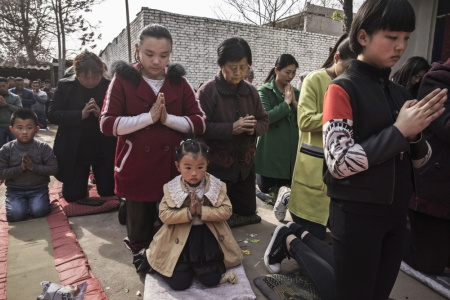Chinese Communist officials raid church-run elementary school camp, arrest pastor's wife

Communist authorities in China’s Henan province raided an elementary school summer camp hosted by a house church and arrested the pastor’s wife after accusing the Christians there of “conducting illegal religious activities.”
According to persecution watchdog China Aid, some 30 authorities with Xinyang City Gushi County Ethnic and Religious Affairs Bureau, Public Security Bureau, and the Joint Chengguan (urban management force) Task Force raided a house church near Gushi Third Middle School North Campus on Aug. 23.
The leader of the church, Wang Guangming, told China Aid that the church was hosting summer camp on the day of the raid. Though students were learning piano, guitar, and music theory, authorities accused leaders of “conducting religious activities” and arrested the pastor’s wife.
“I was not present at the church that day,” Wang told China Aid. “They came and said that we were gathering illegally, and confiscated my personal property, including projector, desks, chairs, fans, and speaker. They have not brought them back as of today.”
Another member told China Aid that officials from the Ethnic and Religious Affairs Bureau claimed they had received “a tip from residents” about an illegal house church which sparked the raid. Claiming to be “law enforcement,” the authorities began videotaping and taking photos.
Henan is one of the provinces in China that has the highest number of Christians, with an estimated 5 million to 6 million believers. International Christian Concern notes that the Xinyang City Gushi County Ethnic and Religious Affairs Bureau previously said that from Aug. 20 to Sept. 20, it would conduct a monthlong investigation to crack down on illegal religious activities.
President Xi Jinping has ordered that all religions must "Sinicize" to ensure loyalty to the atheistic party. As a result, the Chinese Communist Party has attempted to curb the spread of Christianity through its legal framework, Sinicization, closure or demolition of churches or places of worship, arresting of Christians, and social pressure.
Chinese authorities have also attempted to prevent Christians from transmitting their faith to the next generation.
In its 2020 annual report, the U.S. Commission on International Religious Freedom noted the Chinese Communist Party has banned youth younger than 18 from participating in religious services. Additionally, Christian leaders are forbidden from organizing any activities with young people or encourage them to consider ministerial vocations.
Earlier this year, authorities forcibly removed adopted children from their Christian parents, claiming the adoption papers were no longer valid because their children were “trapped by an evil religion.”
In addition to seizing children from their Christian parents, the CCP also threatened to send Christian children to government re-education camps and ordered parents to refrain from enrolling their children in church schools.
In Shangrao, an area of Jiangxi, more than 40 churches have hung a slogan that reads: “Non-locals are prohibited from preaching; no underage people allowed in church."
Aaron Ma, an Asia-based researcher for Open Doors International, told World Watch Monitor that Christians are an “enigma” to the government.
“The CCP (Chinese Communist Party) believes the Church is a destabilizing force, but not because it is bad; in fact, local communities and authorities tend to believe Christians are good people," Ma explained. “Some suggest that because Christians’ allegiance is first and foremost to God and not the Communist Party, there is a conflict of interests that the party believes can potentially hinder the process of unification. Others are more concerned by what they perceive as potential ‘chaos’ arising from the huge number of Christians.”
China has also been labeled by the U.S. State Department as a “country of particular concern” for “continuing to engage in particularly severe violations of religious freedom.”





















